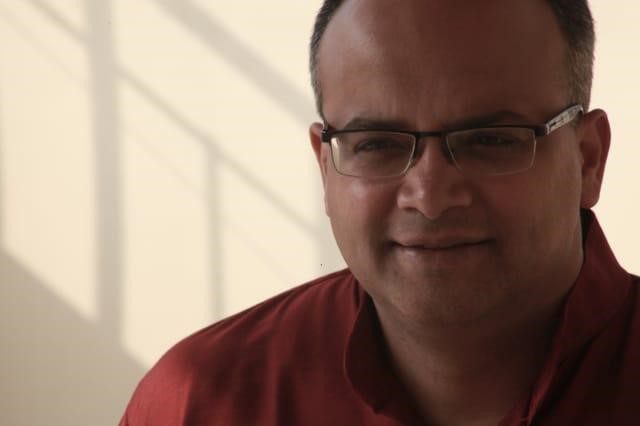
Dida knew how to pick the right vegetables for dinner.
Okra, brinjal, cauliflower & ginger.
Holding an umbrella in one hand
She asked the vendor to weigh a kilo.
In the evening light she measured
His fingers handling the scale
With careful eyes
Learnt from a lifetime’s reading.
She knew
Which way those fingers would go
Which finger could tip the scales
To cheat us of a few grams.
Moving on, she asked
The price of mangoes, those luscious red ones
Recently arrived, with exotic names
Fit for an emperor.
I was only getting acquainted with
The fine art of sifting vegetables
Staring at the beginning of domesticity
While she had a lifetime’s experience.
Bringing up five daughters, with little in the pocket
She knew which way the road would lead.
It shouldn’t be too hard or too soft
She explained, holding a tomato.
It should just feel right in your palms.
Soon I would learn to tell time
From the whistle of a pressure cooker.
It was walking distance –
The way to the 6th floor
In a rented flat just painted.
She would chop vegetables
Watching a crime series on TV.
I lay on my bed
Waiting for a slip disc to disappear.
My wife called every night
To check how things were.
It was her new job, she said
They were training her to sift stories from news bytes.
Over dinner Dida would talk –
Those old days
When women couldn’t go to college.
Now, she said, things were getting better.
Now you can keep roti inside a refrigerator
And preserve feelings like pickle for dinner.
Note: Dida is grandmother in Bangla.
The choice of five husbands
One thought bothered me.
Why couldn’t Kunti take back her words
Once she saw Draupadi, in flesh and blood?
Arjuna had told her: I have something for you, ma.
And Kunti, in the other room, without checking, told him –
Share what you have, Arjuna, with all your brothers.
Arjuna did as told – a mother’s word is as good as god’s.
Why couldn’t Kunti say: Ah, Arjuna!
My words were not for a woman!
They were only for a fruit, a flower, not for a woman like me
Not for any woman.
Draupadi would have lived happily with Arjuna.
Yudhisthira would not have pawned her during the dice game
And all the ruckus in the palace could have been avoided.
Of course, that would have been quite a different story.
But Kunti didn’t take back her words
That would have meant the world to Draupadi.
Sharing five husbands, even those days, was a curse.
Yet she bore it, seething inside
The way fates turned against her.
The Mahabharata is a tale of grey, nothing black and white.
But on this one, Draupadi surely deserved better.
A simple solution was cleverly avoided.
I asked Vyasa why he did this.
Couldn’t he have changed the plot a little?
Just for posterity, if not for Draupadi?
He said that would have altered the larger story.
Single Mother
The night breeze whistles at her ears
An unwilling listener of the dark.
Yoked to work, she leaves early.
Ten stops on, she is there –
At ease with the good mornings & how are you doings
Soft keyboard murmurings & empty blue screens.
Lunch is breakfast not eaten.
Last night’s dinner fills out like a half-moon.
She returns through the veins of the city
The kid is busy with homework.
Weary cargo, rice and potatoes, ferry across the table
Carrying muted scents of bone and home
Where clutter awaits a calm hand
Who can put it together, with a silent embrace.
Who knows grace is what you have inside
When the world is falling apart.
How one must keep moving
Even if the pan froths alone.
creatures of the night
let’s call her neela, those wild blue eyes
sapphire gazing
while you point a white torch
in the general direction of
wilderness, nature, where we came from
& are not going back again.
the leopards live in thick bushes
hiding
from prying human eye
a mother with two cubs
perhaps there’s a male somewhere
chasing hares for supper.
snakes with venom
not as harmful as humans who lurk behind, saying those things –that you are wild at night
you are a strange one
born for other climes
& now with settler wisdom
peering from a machan
deep into the future
for what is not there.
we are all stone chipped, organic, home grown
tasty as locally brewed
yet somewhere there is the feeling
all is not lost
when a spotted one leaps into the darkness
where things spring from.
Abhisarika
I hate to tell you
This is a one-sided affair.
You are waiting at the bus stop
Rain falling all around, in the grey of day
And he doesn’t turn up
For fear those tongues will wag.
Evenings, he is all sugar and honey
As he parts your future with bare hands
His forehead one with the clouds.
But when rain falls mid-day, he is nowhere to be seen.
You tell your companion, the one waiting
At another bus stop, in another city
Where it shines brightest when the day is reveling
On other days, only a dull grey
As if it’s about to rain
As if the sun has decided to stay away.
In both cases, he doesn’t turn up
And is busy elsewhere
At work, maybe with another loved one
And this brings no joy to your pretty lips
When you look at rouge in the mirror
For the hint of an answer.
You ask your friend with pleading eyes
If she has seen someone resembling him, darting past.
And your friend, the one in that foreign city
Has the same question for you.
She was told the precise time and hour
And she came on the dot, and it’s been two hours now
And usually it’s never like this.
She is worried something might have happened
For his phone, just like him
Is not reachable.
But there is a rainbow shining somewhere
When you decide to step out of your own shadow
And meet the future with open arms.
The one who doesn’t have any
Is also looking for someone to meet
Who is not expecting anything in return
At least, not yet.
Whose bag carries meaning in dried fruit and areca nut
And lots of tales about the future
As if he has already seen it.
As for the one who didn’t turn up, forget him
Just like the breeze that comes one night
And is never to be seen again.
He was not worth the trouble, and the likes of him come every day.
It’s just that you have to lasso your heart next time
Like a wandering spirit who likes to lark
Outside the familiar confines of the mind.
That is the most difficult thing, more than waiting for the bus
For someone who might – any time – step out
And ask, what the time is, or what you’ve been doing so long.
Note: ‘Abhisarika’ is Sanskrit for ‘the beloved one’; the one who goes out to meet her beloved.
The child bride learns to read a story
Hiding under the bed
The child bride holds in her hands
A book of stories.
Next to her toys
The bride and groom
Draped in immaculate silk, in dreams of thatch and reed.
She tries to make out
Shapes of letters. The hiss of ‘sha’
The warmth of ‘ma’.
She finds patterns wherever she goes.
In the kitchen, in the dark of soot
While telling fish from bone.
Something flames in her, so fiery
An urge to learn, so deep
The unknown letters are all she knows.
They call her – from everywhere
From the bed and the dark trees outside.
Yet there’s no one to teach her.
One day, discovered in her crime
Reading under the bed, by a startled father-in-law
He wonders where she is headed.
It is only a book she is after
And letters fascinate her
More than anything the boys will ever learn.
She is quaking in fear.
He is leaning against the moment
That will shape her destiny.
He wonders what to do.
The moment passes.
He decides to teach her, to read and write.
He tells her about tools and meanings, journeys and meanderings.
He tells her she is free
To roam the world of letters.
Once begun, there’s no place she cannot reach.
The child bride becomes a mother
Learns her Homer and Shakespeare.
She writes long letters to her great granddaughters
Across the seven seas.
They become scholars and writers, poets and philosophers.
One of them tells her tale today
As another jogs past, in a sparkling tracksuit meant for morning
Confident as the future that arrives so early
Unaware of the rib tickling, the footsteps of those who listen.
Going beyond the life that only words can bring.
The child bride made all this happen, so carefully.
Note: Prof Radha Chakrabarty narrated a wonderful story about her great grandmother, Renuka Chakrabarti, one early spring in 2024 at IIC. This poem is inspired by her telling.
Amlanjyoti Goswami has written two widely reviewed books of poetry, Vital Signs and River Wedding, published by Poetrywala. River Wedding was shortlisted for the Sahitya Akademi award. His poems have been published in journals and anthologies around the world including Poetry, The Poetry Review, Rattle and Penguin Vintage. A Best of the Net and Pushcart nominee, he has read widely in India and abroad. He grew up in Guwahati and lives in Delhi.

Subscribe to our newsletter To Recieve Updates
Join our newsletter to receive updates